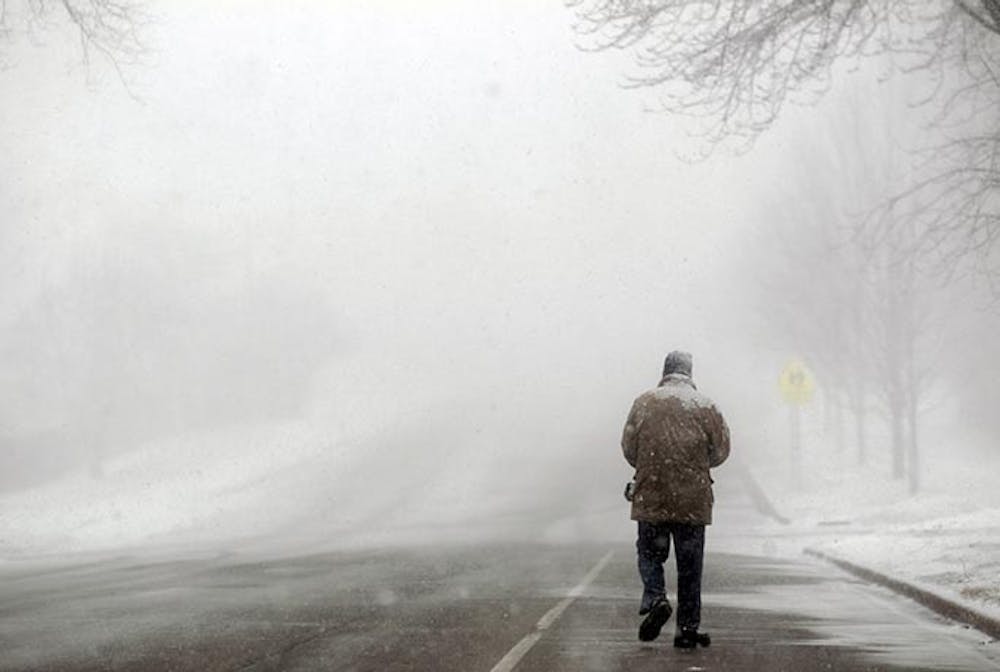CHICAGO — A slow-moving storm that has paralyzed parts of the nation's midsection for days with heavy, wet snow that strained power lines, clogged roadways and delayed hundreds of flights, dumped at least 6 inches of snow on western Michigan early Wednesday as it churned eastward.
The storm that made travel perilous from the Oklahoma Panhandle to the Great Lakes on Tuesday was expected to linger for another day over Chicago and parts of the Midwest. Up to a foot of snow was forecast for northern New England on Wednesday evening.
Up to 4 inches of wet, heavy snow smothered metro Chicago on Tuesday, while as much as 7 ½ inches blanketed some northern suburbs, said Matt Friedlein, a meteorologist with the National Weather Service in northern Illinois. A chilly rain kept city streets slick during the Wednesday morning commute.
Other parts of the Midwest were hit much harder, with more than 15 inches of snow in parts of Oklahoma, up to a foot in Kansas and up to 13½ inches in Missouri. In Iowa, officials warned of hazardous travel conditions as temperatures fell and ice formed on snowy roads.
Keith Voss, manager of the Fareway Grocery in Centerville, Iowa, said he was planning to close up five hours early Tuesday because only a handful of customers had come in.
"The weather here has been really bad. They couldn't get here, most of them, if they wanted to," Voss said. "The town has been pretty rough traveling."
With the power out and an electric water pump silenced, Shannon Wickware and a house full of relatives in Woodward, Okla., which received 15 inches of snow Monday, had only to fetch a pile of snow from outside whenever they got thirsty.
"It's just snow. That's all we can see," Wickware said Tuesday. "We've been trying to melt snow and drinking that. And we've been just trying to keep the fire going."
The weather service said early Wednesday that 6 inches had fallen on Grand Haven and Muskegon in western Michigan, while some Detroit suburbs saw 4 inches of snow. The state's highest accumulations, totaling 5 to 8 inches, were forecast for the rural Thumb region, surrounded on three sides by Lake Huron.
Fueled by a strong low pressure system, the crescent-shape storm began Sunday in Texas, then headed north. On Monday, whiteout conditions made virtually all Texas Panhandle roads impassable, although primary roadways reopened Tuesday when the sun emerged and began to thaw ice and snow-packed surfaces. A hurricane-force gust of 75 mph was recorded in Amarillo, where 17 inches of snow fell. The heaviest snowfall was in Follett, Texas, with 21 inches.
The system, more common in early spring, contained so much moisture that it was difficult to forecast where it would rain or where it would snow — or even if the snow would accumulate, Friedlein said.
At one point, snow fell at a rate of 1-2 inches per hour on the North Side of Chicago and northern counties, he said.
The blizzard came on the heels of another massive snowstorm last week, but experts cautioned that the snowpack now resting on the Plains would likely not bring sufficient relief after months of drought.
"If we get one more storm like this, with widespread 2 inches of moisture, we will continue to chip away at the drought," said meteorologist Mike Umscheid of the National Weather Service office in Dodge City. "But to claim the drought is over or ending is way too premature."
The Missouri Department of Transportation issued a rare "no travel" advisory, urging people to stay off highways except in case of a dire emergency. Conditions were so bad that snowplows slid into ditches, underlining the danger.
The weight of the snow strained power lines and cut electricity to more than 100,000 homes and businesses. Hospitals closed outpatient centers and urgent-care clinics. Early Wednesday, some 40,000 customers in Michigan were without power.
At least three deaths were blamed on the blizzard.
In the northwest Oklahoma town of Woodward, a person was killed after 15 inches of snow brought down part of a roof. The storm was also blamed for the deaths of two people who were killed in rollover crashes Monday on Interstate 70 in Kansas.
Heavy snow pulled down large trees and caused roofs to cave in at businesses in Belton and Warrensburg, Mo. In Columbia, a canopy over gas pumps collapsed at a convenience store.
By late Tuesday afternoon, airlines had canceled almost 500 flights at Chicago's O'Hare and Midway international airports. Some 100 flights were sidelined Wednesday, and yet more were delayed.
Many commuters appeared to heed warnings and either stayed home or left work early. Chicago train cars were half empty during the evening commute, and traffic on some expressways flowed as if it was Sunday afternoon.
"This is fabulous," said Mitzi Norton, 34, of suburban Elmwood Park, as she rode a train home. "I wish I drove."


